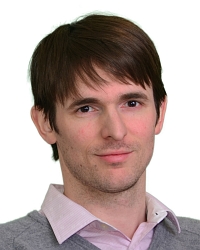TR2020-043
End-To-End Multi-Speaker Speech Recognition with Transformer
-
- , "End-To-End Multi-Speaker Speech Recognition with Transformer", IEEE International Conference on Acoustics, Speech, and Signal Processing (ICASSP), DOI: 10.1109/ICASSP40776.2020.9054029, April 2020, pp. 6134-6138.BibTeX TR2020-043 PDF Video Presentation
- @inproceedings{Chang2020apr,
- author = {Chang, Xuankai and Zhang, Wangyou and Qian, Yanmin and {Le Roux}, Jonathan and Watanabe, Shinji},
- title = {{End-To-End Multi-Speaker Speech Recognition with Transformer}},
- booktitle = {IEEE International Conference on Acoustics, Speech, and Signal Processing (ICASSP)},
- year = 2020,
- pages = {6134--6138},
- month = apr,
- publisher = {IEEE},
- doi = {10.1109/ICASSP40776.2020.9054029},
- issn = {2379-190X},
- isbn = {978-1-5090-6631-5},
- url = {https://www.merl.com/publications/TR2020-043}
- }
- , "End-To-End Multi-Speaker Speech Recognition with Transformer", IEEE International Conference on Acoustics, Speech, and Signal Processing (ICASSP), DOI: 10.1109/ICASSP40776.2020.9054029, April 2020, pp. 6134-6138.
-
MERL Contact:
-
Research Areas:
Abstract:
Recently, fully recurrent neural network (RNN) based endto-end models have been proven to be effective for multi-speaker speech recognition in both the single-channel and multi-channel scenarios. In this work, we explore the use of Transformer models for these tasks by focusing on two aspects. First, we replace the RNN-based encoder-decoder in the speech recognition model with a Transformer architecture. Second, in order to use the Transformer in the masking network of the neural beamformer in the multi-channel case, we modify the self-attention component to be restricted to a segment rather than the whole sequence in order to reduce computation. Besides the model architecture improvements, we also incorporate an external dereverberation preprocessing, the weighted prediction error (WPE), enabling our model to handle reverberated signals. Experiments on the spatialized wsj1-2mix corpus show that the Transformer-based models achieve 40.9% and 25.6% relative WER reduction, down to 12.1% and 6.4% WER, under the anechoic condition in single-channel and multi-channel tasks, respectively, while in the reverberant case, our methods achieve 41.5% and 13.8% relative WER reduction, down to 16.5% and 15.2% WER
Related News & Events
-
NEWS Jonathan Le Roux gives invited talk at CMU's Language Technology Institute Colloquium Date: December 9, 2022
Where: Pittsburg, PA
MERL Contact: Jonathan Le Roux
Research Areas: Artificial Intelligence, Machine Learning, Speech & AudioBrief- MERL Senior Principal Research Scientist and Speech and Audio Senior Team Leader, Jonathan Le Roux, was invited by Carnegie Mellon University's Language Technology Institute (LTI) to give an invited talk as part of the LTI Colloquium Series. The LTI Colloquium is a prestigious series of talks given by experts from across the country related to different areas of language technologies. Jonathan's talk, entitled "Towards general and flexible audio source separation", presented an overview of techniques developed at MERL towards the goal of robustly and flexibly decomposing and analyzing an acoustic scene, describing in particular the Speech and Audio Team's efforts to extend MERL's early speech separation and enhancement methods to more challenging environments, and to more general and less supervised scenarios.
-
NEWS MERL presenting 13 papers and an industry talk at ICASSP 2020 Date: May 4, 2020 - May 8, 2020
Where: Virtual Barcelona
MERL Contacts: Petros T. Boufounos; Chiori Hori; Toshiaki Koike-Akino; Jonathan Le Roux; Dehong Liu; Yanting Ma; Hassan Mansour; Philip V. Orlik; Anthony Vetro; Pu (Perry) Wang; Gordon Wichern
Research Areas: Computational Sensing, Computer Vision, Machine Learning, Signal Processing, Speech & AudioBrief- MERL researchers are presenting 13 papers at the IEEE International Conference on Acoustics, Speech & Signal Processing (ICASSP), which is being held virtually from May 4-8, 2020. Petros Boufounos is also presenting a talk on the Computational Sensing Revolution in Array Processing (video) in ICASSP’s Industry Track, and Siheng Chen is co-organizing and chairing a special session on a Signal-Processing View of Graph Neural Networks.
Topics to be presented include recent advances in speech recognition, audio processing, scene understanding, computational sensing, array processing, and parameter estimation. Videos for all talks are available on MERL's YouTube channel, with corresponding links in the references below.
This year again, MERL is a sponsor of the conference and will be participating in the Student Job Fair; please join us to learn about our internship program and career opportunities.
ICASSP is the flagship conference of the IEEE Signal Processing Society, and the world's largest and most comprehensive technical conference focused on the research advances and latest technological development in signal and information processing. The event attracts more than 2000 participants each year. Originally planned to be held in Barcelona, Spain, ICASSP has moved to a fully virtual setting due to the COVID-19 crisis, with free registration for participants not covering a paper.
- MERL researchers are presenting 13 papers at the IEEE International Conference on Acoustics, Speech & Signal Processing (ICASSP), which is being held virtually from May 4-8, 2020. Petros Boufounos is also presenting a talk on the Computational Sensing Revolution in Array Processing (video) in ICASSP’s Industry Track, and Siheng Chen is co-organizing and chairing a special session on a Signal-Processing View of Graph Neural Networks.
